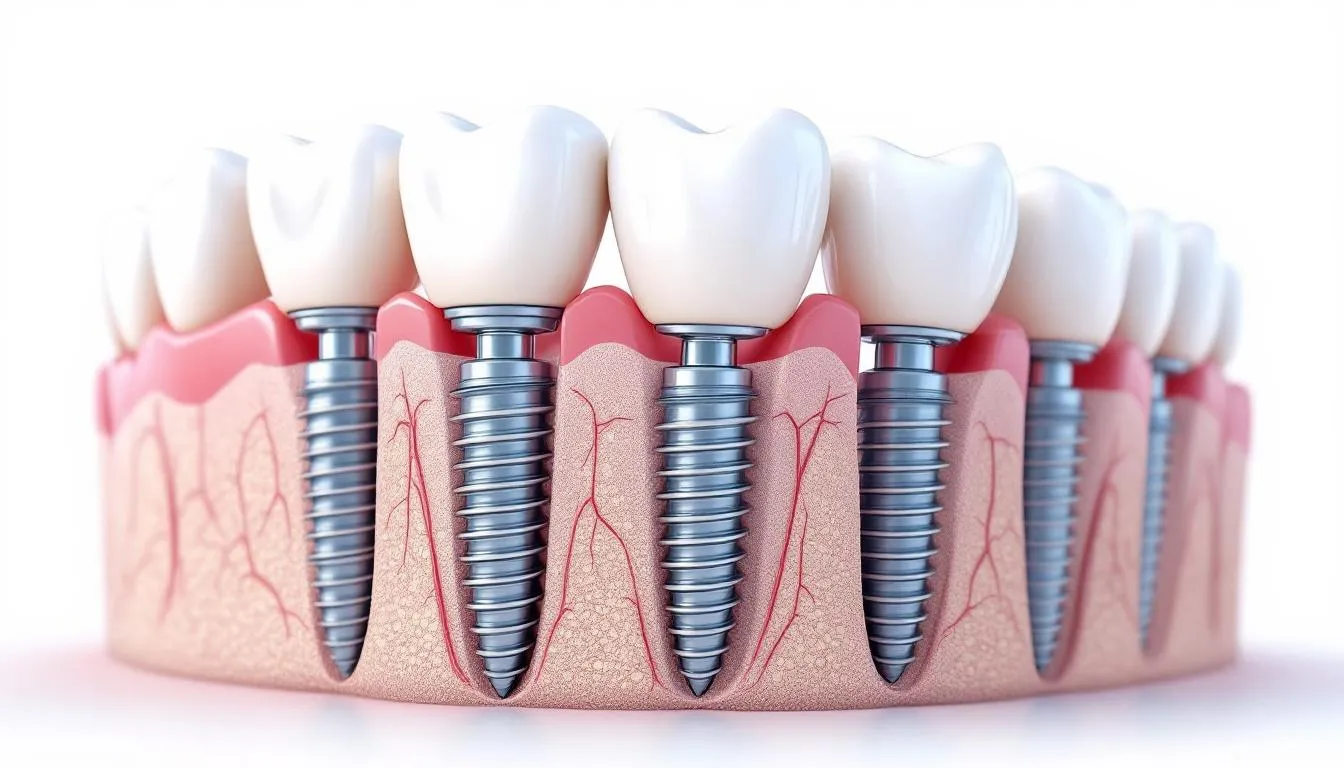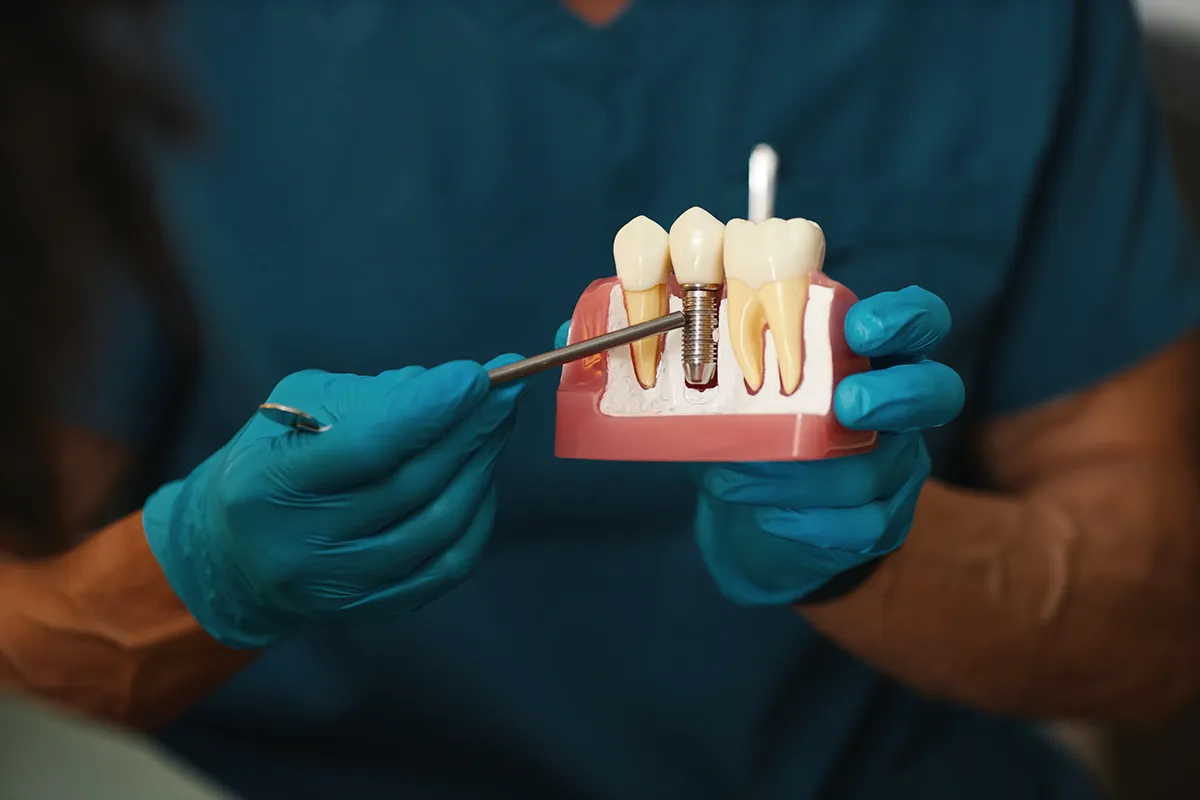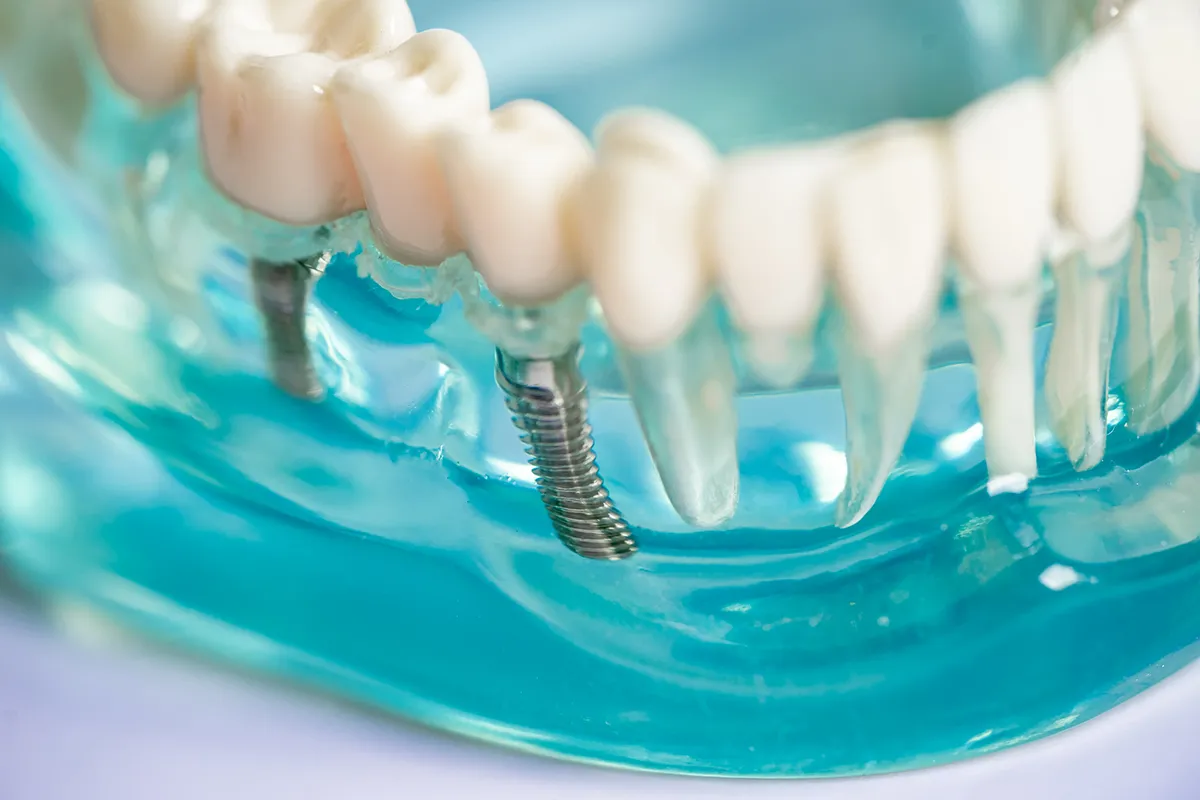Looking for affordable dental implants? This article outlines budget-friendly options, ensuring quality care without breaking the bank. From single tooth replacements to full arches, we explain your choices, cost factors, and financing options.
Key Takeaways
- Dental implants, provide a stable and permanent solution for missing teeth, offering various replacement options including crowns and dentures.
- Factors influencing the cost of dental implants include material quality, procedure complexity, and geographic location, making it essential for patients to plan accordingly.
- Dental implants boast numerous benefits, including improved functionality, natural appearance, and the prevention of bone loss, contributing to better overall oral health.
Understanding Dental Implants

Dental implants are the gold standard for replacing missing teeth, serving as artificial roots that provide a stable and durable foundation for various replacement options such as crowns, bridges, and dentures that provide a stable foundation for various replacement options such as crowns, bridges, and dentures. Unlike traditional dentures, which can slip and cause discomfort, dental implants offer a permanent solution that closely mimics the functionality and appearance of natural teeth.
But what exactly are dental implants, and how do they work? This section will explain the components and types of dental implants, highlighting why they are a preferred choice for many looking to restore their smiles.
What is a dental implant?
A dental implant is essentially an artificial tooth root that is surgically placed into the jawbone. Key aspects of dental implants include:
- Made primarily from titanium
- Renowned for their durability and biocompatibility
- Ability to integrate seamlessly with the jawbone through a process called osseointegration
This integration process ensures that the implant provides a stable and long-lasting foundation for the replacement tooth.
Placing a dental implant involves the following steps:
- Making an incision in the gums to expose the bone
- Allowing time for the bone to grow around the implant, securing it in place
- Enhancing stability with an abutment, which connects the implant to the replacement tooth or crown.
Types of Tooth Replacements on Implants
Dental implants are incredibly versatile, supporting a range of tooth replacement options to meet various needs. For those missing a single tooth, a crown can be securely anchored to the implant, providing both stability and a natural appearance. When multiple teeth are missing, implant-supported bridges can be used, where implants act as anchors for the bridge, enhancing stability and functionality.
For individuals who have lost all their teeth in the upper or lower jaw, implant-supported full dentures offer a reliable and comfortable solution. These dentures are securely attached to implants, eliminating the need for adhesives and allowing for better chewing and speaking capabilities.
Dental implants are highly adaptable, making them ideal for comprehensive tooth replacement solutions.
Affordable Dental Implant Options

Affordability is a key concern for many considering dental implants, and fortunately, there are several options available that cater to different budgets. At Dentistry on Guelph, we offer dental implants making it possible for more people to benefit from this life-changing procedure. The dental implants cost can vary based on individual needs and the specific type of replacement chosen.
This section will cover three main types of affordable dental implant options: single tooth replacement, multiple teeth replacement, and the innovative ALL-ON-4 method, which allows for a full arch replacement using only four implants.
Single Tooth Replacement
For individuals missing a single tooth, dental implants offer a permanent and aesthetically pleasing solution. Unlike traditional bridges that require adjacent teeth to be filed down, a single tooth replacement with an implant preserves the integrity of the surrounding teeth. This option not only restores full functionality to the mouth but also blends seamlessly with natural teeth, providing a natural and confident smile.
Single tooth replacement costs can vary but are generally more affordable than multiple teeth replacements.
Multiple Teeth Replacement
When multiple teeth are missing, implant-supported bridges offer a cost-effective and stable solution:
- One or two implants can support a bridge, reducing the number of implants needed and lowering the overall cost.
- This method provides enhanced stability compared to traditional bridges or partial dentures.
- It also offers improved functionality over traditional options.
Most dental insurance plans cover a percentage of the cost for crowns, bridges, and dentures, making multiple teeth replacement a more accessible option for many patients. This approach not only restores the full function of the mouth but also improves overall oral health by preventing the shifting of adjacent teeth.
Full Arch Replacement with Only Four Implants
The ALL-ON-4 method is a revolutionary approach that allows for the replacement of an entire arch of teeth using only four implants. This technique offers several advantages:
- Significant cost savings and efficiency, as fewer implants are needed to support a full set of upper or lower teeth.
- Strategic placement of implants to maximize support and stability.
- A secure and permanent solution for tooth replacement.
This method is ideal for individuals who have lost all their teeth and are looking for a fixed alternative to traditional dentures. The ALL-ON-4 technique not only improves chewing and speaking abilities but also enhances the overall appearance of the smile, providing a transformative impact on the patient’s quality of life.
Factors Influencing Dental Implant Costs
The cost of dental implants can vary widely based on several factors, including the choice of materials, the complexity of the procedure, and the geographic location of the dental practice. Understanding these factors can help patients make informed decisions and plan their budgets accordingly.
This section will delve into how material quality, procedure complexity, and geographic location influence the overall cost of dental implants.
Material Quality
The quality of materials used in dental implants plays a significant role in determining their cost and longevity. High-quality materials like titanium, which is biocompatible and promotes strong bonding with the jawbone, are essential for the success and durability of the implants.
While the initial expense may be higher, investing in premium materials ensures better value in the long-term by reducing the need for repairs or replacements.
Procedure Complexity
The complexity of the implant procedure can significantly impact the overall cost. Additional procedures, such as bone grafting, may be necessary to provide adequate support for the implants, especially in cases where the jawbone density is insufficient. The more complex the procedure, the higher the associated costs, as it may involve multiple stages and specialized expertise.
Geographic Location
Geographic location is another crucial factor influencing the price of dental implants. Prices can vary based on local market rates and the price of living in different areas. Typically, dental implant prices are higher in urban areas compared to rural locations.
Patients may find it beneficial to compare prices across different regions in the same way to find the most affordable options.
Benefits of Choosing Dental Implants

Dental implants offer a multitude of benefits that make them a preferred choice for many seeking to replace missing teeth:
- They closely mimic the functionality of natural teeth, significantly improving chewing ability and overall oral health.
- They are known for their durability.
- They have low maintenance needs, making them a cost-effective solution in the long run.
This section will explore the specific benefits of dental implants, including improved functionality, aesthetic advantages, and their role in preventing bone loss.
Improved Functionality
Dental implants provide superior comfort and function compared to traditional dentures. Implant-supported dentures deliver over ten times the biting force, allowing patients to enjoy a greater variety of foods, including those that are difficult to eat with traditional dentures. This improved functionality not only enhances self-confidence but also contributes to better overall nutrition and health.
With over 90% of implants remaining successful after ten years, dental implants have a high success rate, outperforming traditional crowns and bridges.
Aesthetic Advantages
One of the most significant benefits of dental implants is their natural appearance. The design of dental implants closely mimics natural teeth, allowing them to blend seamlessly with existing teeth and significantly enhancing the smile.
This aesthetic improvement can greatly boost a person’s self-assurance and willingness to smile openly, enhancing their overall quality of body security life.
Preventing Bone Loss
Dental implants play a crucial role in preserving jaw bone health by stimulating the bone, preventing the atrophy that occurs with tooth loss. Maintaining jawbone density is essential for supporting facial structure.
Dental implants effectively counter the negative effects of prolonged tooth loss and help maintain a healthier bone.
The Implant Placement Process

The journey to receiving dental implants involves several stages, from the initial consultation to the final placement of the crown. The entire process usually spans several months, allowing for proper healing and integration of the implant. Regular dental visits during this time help ensure the success of the procedure and address any issues that may arise.
This section will detail several actions of the implant placement process, including the initial consultation, implant surgery, and the healing process and follow-up care.
Initial Consultation
It is a vital part of the dental implant process, where the dentist evaluates the patient’s oral health and discusses their specific needs. During this visit, assessments such as X-rays and oral examinations are performed to determine the condition of the jawbone and surrounding tissue. Based on these assessments, the dentist creates a personalized treatment plan that outlines the steps necessary for the dental implant procedure.
Patients will have a clearer understanding of the dental implant process and what to expect. This planning stage is crucial for ensuring a successful outcome and addressing any concerns.
Implant Surgery
The implant surgery itself is a critical step in the dental implant process. During the procedure:
- The dentist uses local anesthetic to numb the area and ensure patient comfort.
- In some cases, sedation is recommended for extensive procedures to help patients relax.
- The implant is placed into the bone.
This implant acts as an artificial tooth root that will eventually support the replacement tooth.
In certain situations, an implant and its corresponding crown or bridge can be placed on the same day, minimizing the number of visits required. However, in most cases, the implant is left to heal and integrate with the jawbone for several months before the final crown or denture is attached. This integration process ensures a secure and stable foundation for the replacement tooth.
Healing Process and Follow-Up
The healing process following implant surgery is crucial for the long-term success of the dental implants. Typically, the healing time ranges from two to six months, during which the implant integrates with the jawbone through a process called osseointegration. Patients can usually resume normal activities within one day, or three to four days if extensive surgery was performed. It is essential to follow the dentist’s care instructions to ensure proper healing and avoid complications.
Regular follow-up visits are necessary to:
- Monitor the healing and ensure the implant is integrating correctly with the jawbone.
- Remove the implant if it does not fuse properly, allowing the site to heal before another implant can be placed.
- Address any concerns and make adjustments as needed to ensure the success of the implant.
Financing and Insurance Options
Understanding the financing and insurance options available for dental implants can make this valuable treatment more accessible. Many dental practices offer zero-interest financing plans, allowing patients to manage the cost of implants through affordable monthly payments. These plans can be tailored to fit individual budgets, making it easier for patients to get the treatment they need without financial strain.
In addition to financing options, some insurance plans may cover a portion of the cost for dental implants. However, coverage can vary widely, and it is important to understand the specific terms of your policy.
This section will explore the details of financing plans and insurance coverage for dental implants.
Financing Plans
Financing plans are designed to help patients manage the cost of dental implants by breaking it down into manageable monthly payments. Many dental clinics offer in-house financing programs or work with third-party financing companies to provide flexible payment terms. These options can be particularly helpful for those who may not have the immediate funds to cover the entire cost of the procedure.
Choosing a payment plan that fits their budget allows patients to decide on the dental care they need without delay.
Insurance Coverage
Insurance coverage for dental implants can vary significantly between different policies. Many dental plans may limit coverage for implants or require pre-approval for higher costs. It is crucial to understand your policy’s coverage limits and any potential waiting periods before the procedure can be covered. Ensuring that you maximize your insurance benefits can help offset the overall cost of dental implants.
In Canada, for example, some dental insurance plans may cover a portion of the costs, but it is important to check for any exclusions.
Special Care for Dental Implants

Proper care and maintenance are essential for the longevity and functionality of dental implants. Just like natural teeth, dental implants require daily oral hygiene and regular dental check-ups to prevent issues and ensure their long-term success.
This section will cover recommended daily oral hygiene practices and the importance of regular dental check-ups for maintaining healthy dental implants.
Daily Oral Hygiene
Maintaining daily oral hygiene is crucial for longevity of dental implants. Recommended practices include:
- Using a soft-bristle toothbrush and low-abrasive toothpaste for effective cleaning without damaging the implants.
- Brushing twice a day and flossing daily, especially around the implants and abutments, to remove debris and bacteria that can lead to gum disease and other issues.
- Using interdental brushes or specialized floss to clean hard-to-reach areas around the implants.
Adopting these daily oral hygiene practices ensures that dental implants remain healthy and functional, offering a long-lasting solution to tooth loss. Regular care not only protects implants but also contributes to overall oral health and well-being.
Regular Dental Check-Ups
Regular dental check-ups are essential for monitoring the stability of dental implants. During these visits, dentists can assess the integration of the implants and identify any potential issues early on. Professional cleanings help remove plaque and tartar build-up around the implants, ensuring they remain clean and healthy.
Regular check-ups and professional cleanings are crucial for the longevity and success of dental implants. Staying proactive with dental visits helps maintain a confident smile and ensures the full benefits of dental implants for years to come.
Common Concerns and Misconceptions
Despite the numerous benefits of dental implants, some common concerns and misconceptions may deter individuals from considering this treatment. Understanding and addressing these concerns can help alleviate anxiety and provide a clearer perspective on the procedure.
This section will address common concerns related to pain and discomfort, the longevity of implants, and age and eligibility for the procedure.
Pain and Discomfort
The thought of implant surgery can be daunting, but the pain and discomfort associated with the procedure are typically minimal. The discomfort level after implant placement is comparable to that experienced after a tooth extraction. Most patients find the recovery to be easier than expected, often returning to normal activities quickly, making the experience relatively painless.
Over-the-counter medications like ibuprofen (Advil/Motrin) can effectively manage pain.
Longevity of Implants
Dental implants are known for their high success rate, with over 90% of implants remaining successful after ten years. While the implants themselves are durable, the teeth on top of them may require maintenance or repair over time.
Proper care and regular dental visits can help ensure the longevity and effectiveness of dental implants.
Age and Eligibility
Dental implants are suitable for adults of various age groups, making them a versatile solution for tooth loss. Age is not typically a barrier, and both younger and older adults can benefit from this treatment.
Effective diabetes management is crucial for diabetic patients considering dental implants to ensure successful outcomes.
Summary
In conclusion, dental implants offer a reliable, durable, and aesthetically pleasing solution for replacing missing teeth. They closely mimic the functionality of natural teeth, improve oral health, and boost self-confidence. Dental implants have become more accessible, allowing more people to enjoy their benefits. Understanding the factors influencing costs, the placement process, and the importance of proper care can help patients make informed decisions.
By choosing dental implants, you are investing in a long-term solution that not only restores your smile but also enhances your overall quality of life. Embrace the possibility of a confident, radiant smile .
Frequently Asked Questions
What are dental implants?
Dental implants serve as artificial tooth roots that create a secure base for replacement teeth, effectively replicating the function of natural teeth. They are a reliable solution for restoring dental functionality and aesthetics.
How much do dental implants cost?
Dental implants typically start at around $4000 at Dentistry on Guelph, though prices may vary based on specific needs and circumstances. It is advisable to consult with a dental professional for a personalized estimate.
What is the ALL-ON-4 method?
The ALL-ON-4 method utilizes four implants to securely support a complete set of upper or lower teeth, offering a stable and economical dental solution.
How long does the implant placement process take?
The entire implant placement process typically requires several months, encompassing the consultation and culminating with the final crown placement, to ensure adequate healing and integration.
Are dental implants suitable for older adults?
Dental implants are suitable for older adults, as age generally does not hinder the ability to receive this treatment. Many older individuals successfully undergo the procedure.




